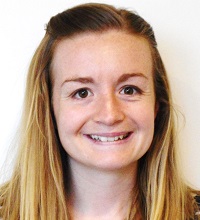Personal Profile – Hannah Bloomfield
Who are you and what do you do?
I am a post-doctoral research scientist working at the University of Bristol hydrology department. The main part of my job is to use large climate datasets (including lots of satellite data) to understand the potential damage that large weather events, like wind storms and floods, can cause to European infrastructure. I have only recently started this job and for the last few years, I’ve been working as a climate scientist at the University of Reading meteorology department. At Reading, I worked on the impacts of climate variability and climate change on national power systems. We have developed a number of models to use large climate datasets to understand variability in wind power, solar power and demand around the world, including Europe, Mexico and Africa.
What is a normal day for you like?
A typical day for me involves spending the majority of my time at my laptop writing computer code to analyse large weather datasets. Throughout the week there will be meetings with collaborators and my boss to discuss results, and seminars organised by University groups about interesting work other scientists are doing. There may also be meetings with students to talk about their ongoing projects. Throughout the day I end up drinking a lot of cups of tea and eating plenty of biscuits to keep me going.

What is your favourite thing about the subject you study/your job?
I love the opportunities my job has given me to travel. I’ve been lucky enough to be invited to present my work at some really fantastic conferences in locations such as Colorado, Perth (the Australian one!), Italy and Austria. I always take the opportunity to have a bit of a holiday after these conferences as they’re often very intense, and I’ve now seen some places I don’t think I would have been able to without this job!
When did you know you wanted to pursue a career in the space sector?
I didn’t know until quite near the end of my undergraduate degree. I studied natural sciences at the University of East Anglia where I had Maths and Physics majors. However, a lot of the physics content here came from the environmental science school, including modules in fluid dynamics and meteorology. It was during these final year meteorology modules that I learnt about satellite data and how it can be useful to understand lots of useful scientific problems. I saw a PhD advertised which was looking at the impacts of climate variability on the GB power system and decided this was the field I wanted to work in!
What did you study at school?
In my GCSE’s I picked triple science, music, history and German and after this decided to go down the ‘science route’. For my A-levels, I studied maths, further maths physics and chemistry (with music at AS level). This was pretty heavy going! But it did give me a good foundation to start my natural sciences degree. I pushed myself a bit hard in my A-Levels and didn’t quite get the grades I needed for my first choice university degree (chemistry was a disaster!) but i’m happy to say I had a fantastic time doing natural sciences at the University of East Anglia, my second choice, and it was definitely the right course for me with hindsight.
What has your journey so far been like?
So far my journey has felt like a bit of a whirlwind! I feel like I stumbled into my PhD a little bit after learning at a very late stage the type of science I really enjoyed. Thankfully since then I’ve realised I really enjoy climate science and have worked on a number of projects about wind storm risk, renewable energy and the development of future energy systems. The common ground in all the things I’ve worked on is ‘climate impacts’ and I think I’m now starting to find the topics that really interest me and understand what I really value in a job. I’ve recently started a new job at the University of Bristol and I’m excited for the next stage of my journey!
What advice would you give to your younger-self?
Be brave! I am very proud of what I’ve achieved but I remember being very scared of all the decisions I made as they came about. When picking a university course, applying for summer placements, applying for a PhD and subsequent jobs I was plagued by imposter syndrome and always thought others were better than me. I think this is very common in academia, but we all need to be proud of what we can do!
Click here to learn more about Hannah’s work.
